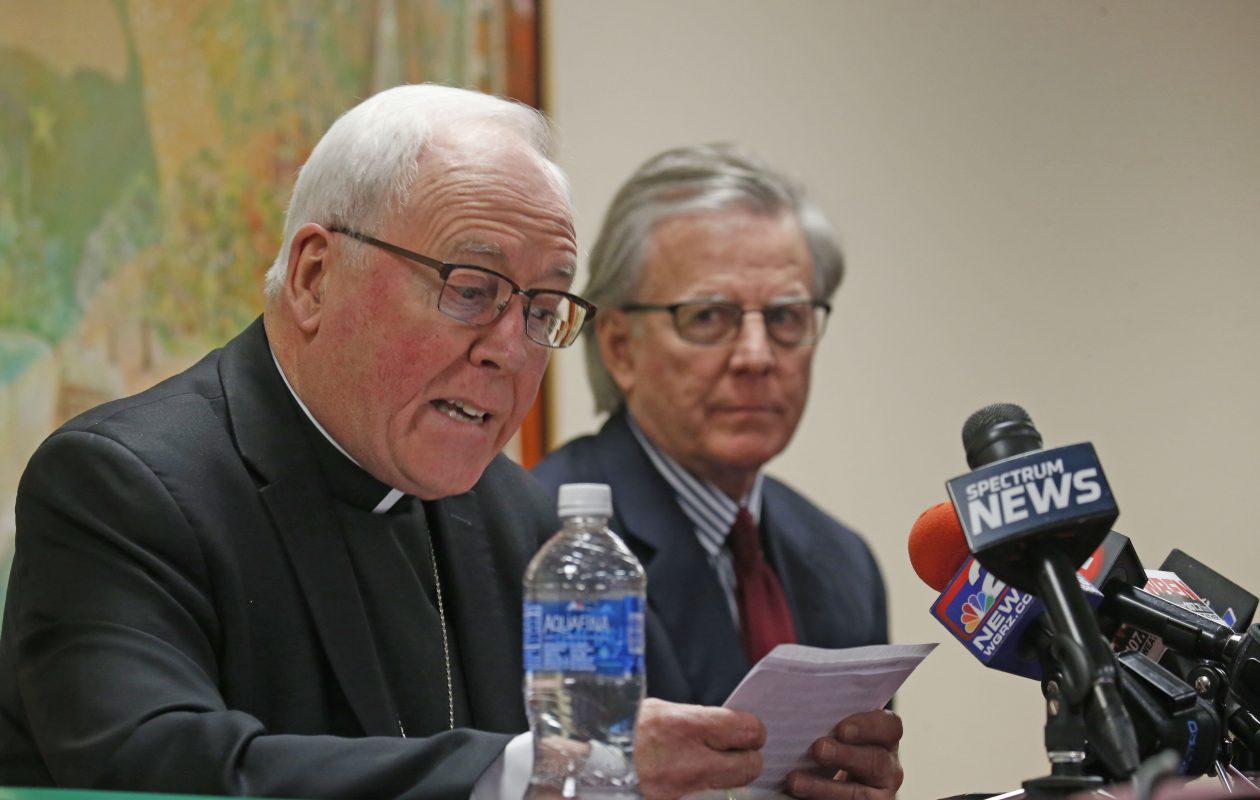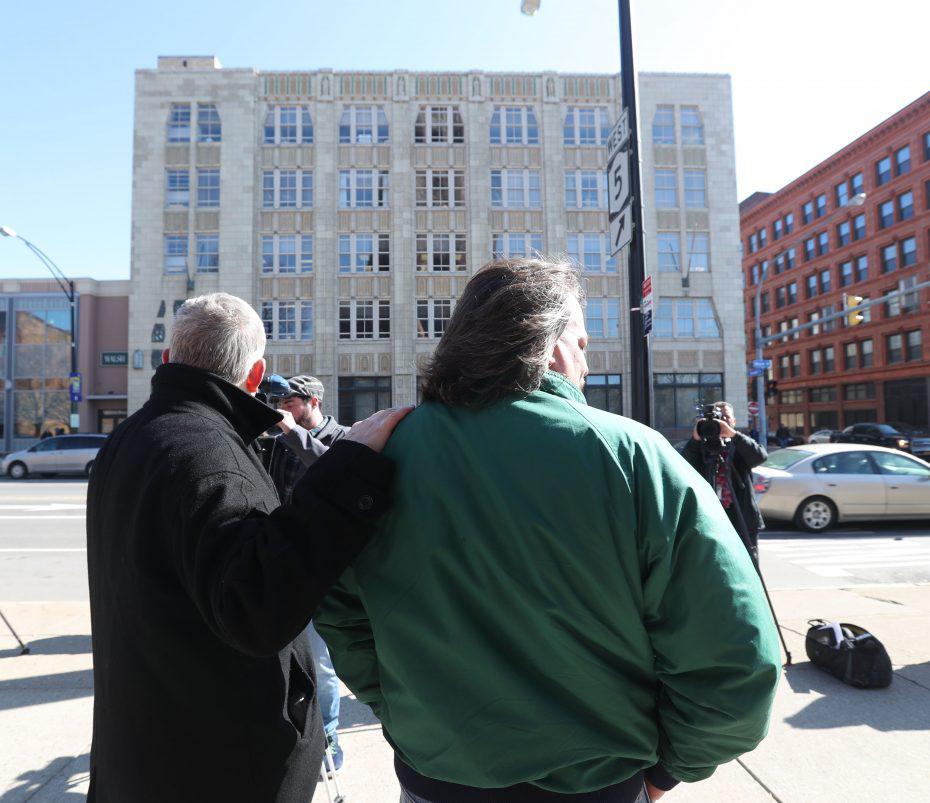|
Critic of clergy abuse compensation program: 'It's a virtual black hole'
By Jay Tokasz
Administrators of a Diocese of Buffalo program to compensate childhood victims of clergy sex abuse will consider whether the diocese had "prior notice" of an alleged abuser's conduct as they determine how much money the victims should get. But it's unclear if diocesan officials are under any obligation to hand over personnel files that show whether the diocese knew a priest was prone to abuse. That's one of the compensation program's major shortcomings, according to lawyers for some of the victims. People who make claims of abuse with the diocese aren't told what information, if any, the diocese provides to program administrators. "It's a virtual black hole of a protocol," said J. Michael Reck, an attorney who represents more than 30 clients who filed claims with the Buffalo compensation program. The whole process is vastly different from civil litigation, where a court can compel both parties to produce documents and testimony. Both sides in litigation also must be made aware of evidence or testimony brought forward by the opposing side. A diocesan spokesman declined to answer questions about whether the diocese would reveal clergy files to administrators. “Both the claimant and the diocese are free to submit whatever they feel is relevant to the claim. The procedure is designed to accommodate a more timely resolution without years of litigation," spokesman George Richert said in an emailed statement. "Also, unlike litigation, the diocese must accept the determination of the administrators but the claimant does not have to accept the decision.” Richert declined to say how many people applied for compensation or the anticipated cost of the claims. Six lawyers contacted by The News in June said they collectively represented more than 90 clients who filed claims. The plan administrators – former state Surrogate Court Judge Barbara Howe and former state Supreme Court Justice Jerome Gorski – also would not discuss how many claims they are reviewing or their process for determining who will receive awards and what amounts they will get. "It is our conclusion that this entire process as it relates to us as co-administrators must be kept confidential," Howe wrote in response to a request for an interview. Howe reiterated the need for confidentiality and stated that the protocols of the diocese's compensation program "make our work very different than traditional, transparent, 'open courtroom' proceedings." 'Records are hidden'Lawyers who submitted claims on behalf of victims said the confidential nature of the program makes it difficult for them to build a case that proves their clients were abused. "The diocese has this information," said Reck. "The plan administrators don't generally tell us the information the diocese has provided to them. I don't know what they tell them." The diocese, he added, "should be able to turn over to plan administrators the files [that show], 'This is when we were contacted. This is when we knew," Reck added. "But we don't have the normal transparency that comes with a courtroom proceeding." Town of Tonawanda attorney Kevin Stocker represents six men who say they were molested by priests as children. Stocker said he interpreted the diocese's compensation program as being akin to an arbitration proceeding, which, like litigation, allows for attorneys to subpoena information. So Stocker said he sent a letter to the diocese's attorney, Terrence M. Connors, with a subpoena for diocesan files on the priests his clients accuse in their claims. "I got an email back from the diocese lawyer, saying basically, 'You know you're not going to get that,' " said Stocker. Stocker said he also reached out to the program administrators for clarification. They replied that they would be in touch with him in the future, he said. "It's an important issue, because they're the ones that are requiring the prior notice and yet they're not turning over the records," said Stocker. "Those records are hidden somewhere." Stocker said the compensation program was little more than a diocesan effort to "shake the tree" for victims so it can keep church documents under wraps and save the church's money and reputation. "This is all a game to buy off future lawsuits on the cheap," he said. The terms of the compensation program stipulate that victims who accept a monetary award agree to give up their rights to sue the diocese. In parts of the country where legislation extended the statute of limitations on child sex abuse cases or allowed the statutes of limitations to be waived temporarily, civil lawyers unearthed a trove of church documents that showed how church officials covered up abuses. The documents led to huge settlements with victims. But New York has among the most restrictive statutes of limitations in the nation for civil child sex abuse lawsuits. And lawyers for clergy abuse victims say the compensation programs are the church's efforts to keep at bay a version of the Child Victims Act legislation that would allow lawsuits from decades ago to proceed in New York courts. Boston attorney Mitchell Garabedian, who represents 31 clients who applied to the Buffalo Diocese compensation program, said the program in Buffalo and in other dioceses across the state was created as a public relations maneuver to "discourage legislators" from passing any bill that would allow more childhood victims to sue the diocese. Garabedian said compensation programs prevent a fuller accounting of the scandal in New York, including which church administrators covered up abuses and shuffled around pedophile priests. "We don't know what information they have, but they're not producing any documents that they give to the administrators showing that a person, a priest, was a pedophile or not," said Garabedian. "There's no transparency here. They're not releasing documents." Several factors consideredGarabedian said about 1,200 people have applied to compensation programs in the state's seven Catholic dioceses and one archdiocese. If the diocese spends a few million dollars on claims and keeps its documents under wraps, "that's a great deal for the diocese financially," said Garabedian. "I'm sure they've sat down with their economic people and said, this is the approach we'll take, because if you're a bean counter, this is only going to cost us 'X' when if we took another approach it may cost us a thousand times 'X'. I mean, it's all strategy." Childhood victims of clergy sex abuse had until June 1 to apply to the diocese's compensation program. Neither the diocese nor the administrators gave any indication of when they would start offering claim awards. In addition to whether the diocese had prior notice of abuse, Howe and Gorski are considering the extent to which the diocese and a person bringing a claim can document and corroborate the "nature, frequency and time of the alleged sexual abuse," according to a summary of the compensation program released by the diocese. The administrators, in deciding to accept or reject a claim, also consider: • Whether the allegations of abuse are consistent with those made by other victims. • Whether the alleged abuse was reported at the time to church officials, law enforcement, parents, friends or others. • Whether there are medical or counseling records relevant to the alleged abuse. The amount of the awards are based on the nature, extent and frequency of the abuse and "aggravating circumstances," such as the age of the victim, the severity of the abuse, the location of the abuse, whether there were threats of physical harm or retaliation, and "significant, verifiable and life-altering psychological damage." Diocese gets no appealThe diocese announced the program at a March news conference, in which Connors emphasized that the administrators would be free to make decisions as they see fit. "The only participation of ours will be, if they're represented by counsel, they submit to the administrator to review their claim, and we can submit as well. If someone submits a claim that we've investigated, we know it to be false, we will notify the administrator," Connors said at the time. "And there's a certification on the claims. They must certify, under penalty of perjury or prosecution if it's false. So that protects us, and it protects the administrators as well." Connors said the administrators will ask the diocese and its attorneys for their input. "But that's all we have here is input. We will submit the information we have, what records we've accumulated over the years and they will make the decision," he said. The decision rendered by the administrators is binding on the diocese, said Connors. "We have no appeal for decision. But the individuals that make the claims have every right to withdraw at any point during the process. It's a voluntary program for them," he said. As it stands now, he added, victims "have no viable legal option" and no opportunity to be heard on their claims and "get some closure. "And that to many of them is more valuable than anything else," he said But Garabedian said that the program is not independent of the diocese, as diocesan officials say it is, because the diocese is likely paying the administrators for their work. "They're never independent. Who's paying them?" he said. "I'm not paying them. If I was paying them, anyone would say, 'Well, they're not independent.' Well, the church must be paying them … so, I mean, they're not independent." Richert would not comment on how much the diocese was paying Howe, who is senior counsel at the Woods Oviatt Gilman law firm, and Gorski, a mediator and arbitrator with National Arbitration and Mediation. The idea for compensation programs for clergy abuse victims was first proposed more than 15 years ago by Patrick J. Schiltz, a former law professor and associate dean at the University of St. Thomas School of Law, who had represented dioceses in clergy sex abuse cases. Schiltz suggested a national tribunal of independent experts to arbitrate sex abuse claims as a way to ward off costly litigation and repair the church's battered reputation, following the clergy abuse scandal in the Archdiocese of Boston. Schiltz, who is now a federal judge, envisioned dioceses opting into the program and paying victims whatever the tribunal decided was fair. Victims, he wrote, would be assured timely compensation, while dioceses would save millions in attorney fees and avoid the potential risk of huge jury awards if the cases went to litigation. The national tribunal never happened, and several dioceses had to declare bankruptcy due to the expense of abuse cases that ended up in court. Dioceses in New York State aim to avoid the same fate.
|
.
Any original material on these pages is copyright © BishopAccountability.org 2004. Reproduce freely with attribution.

